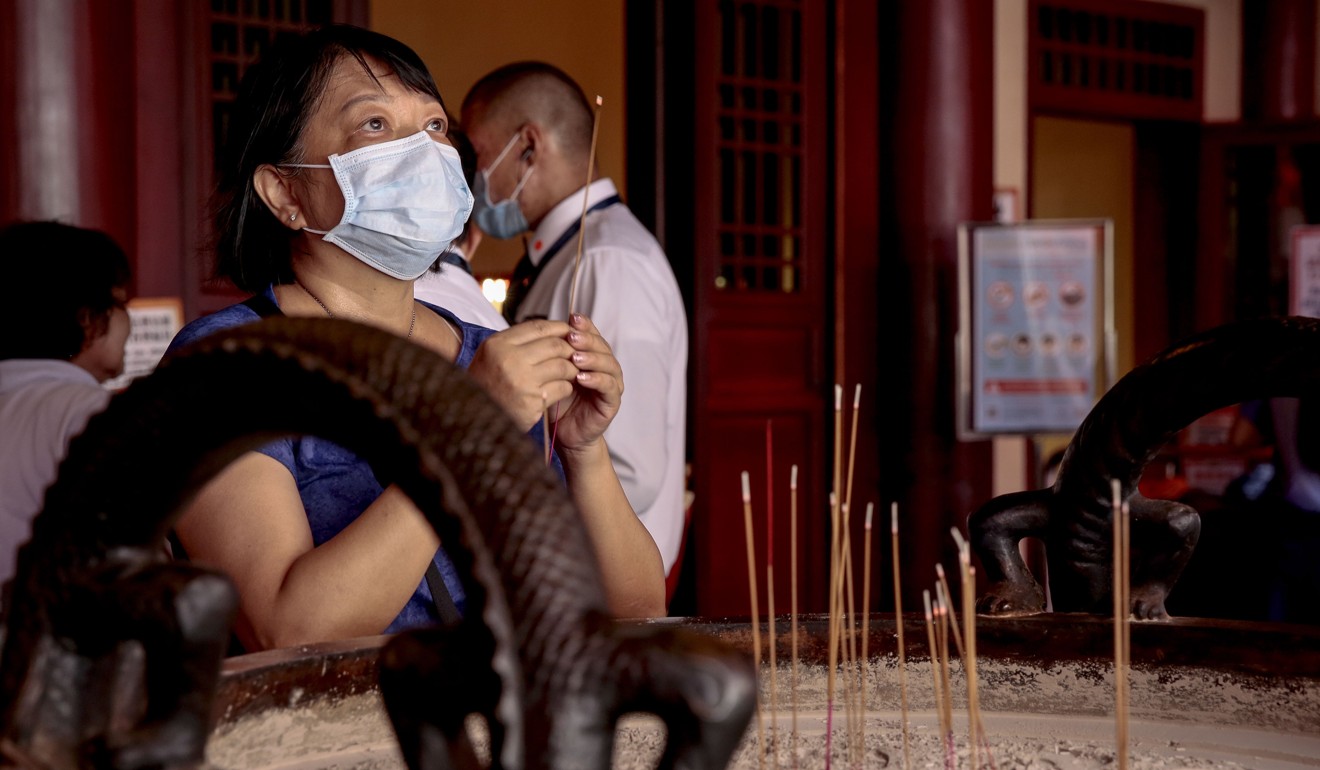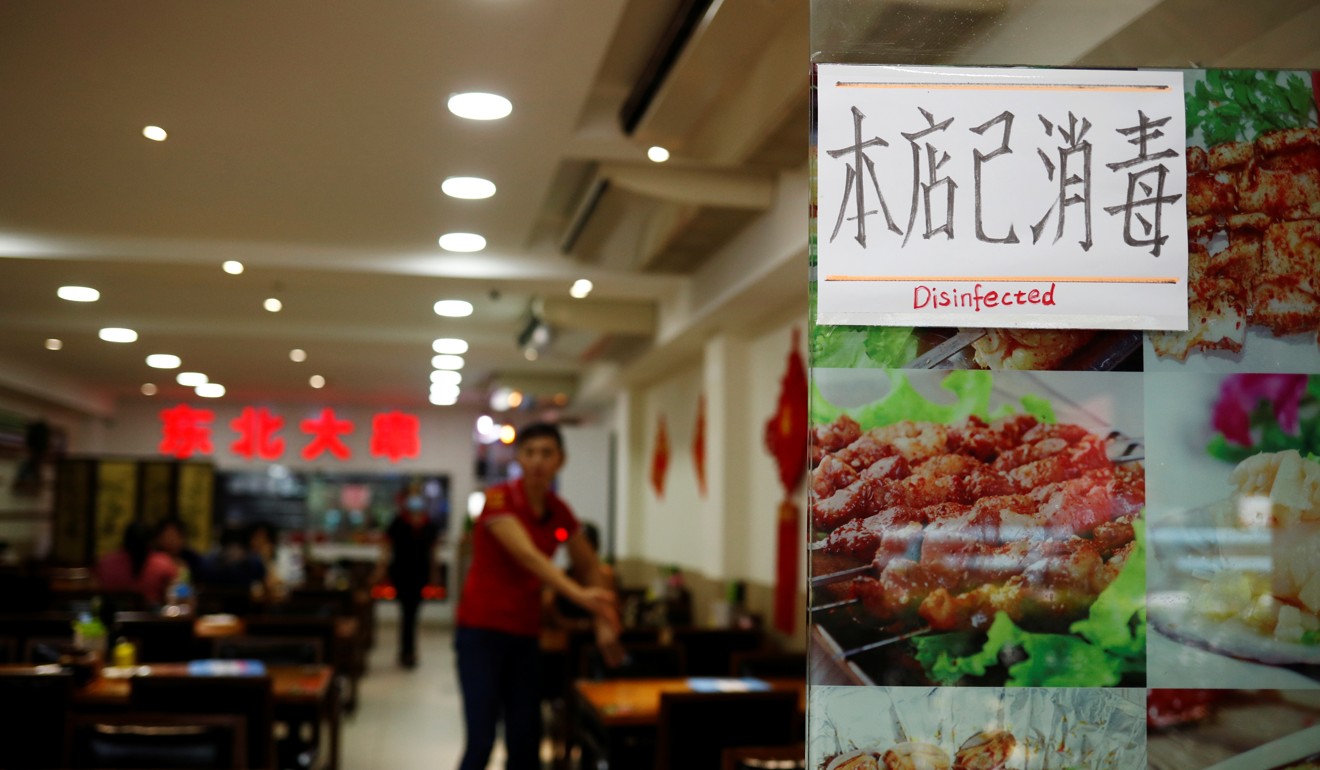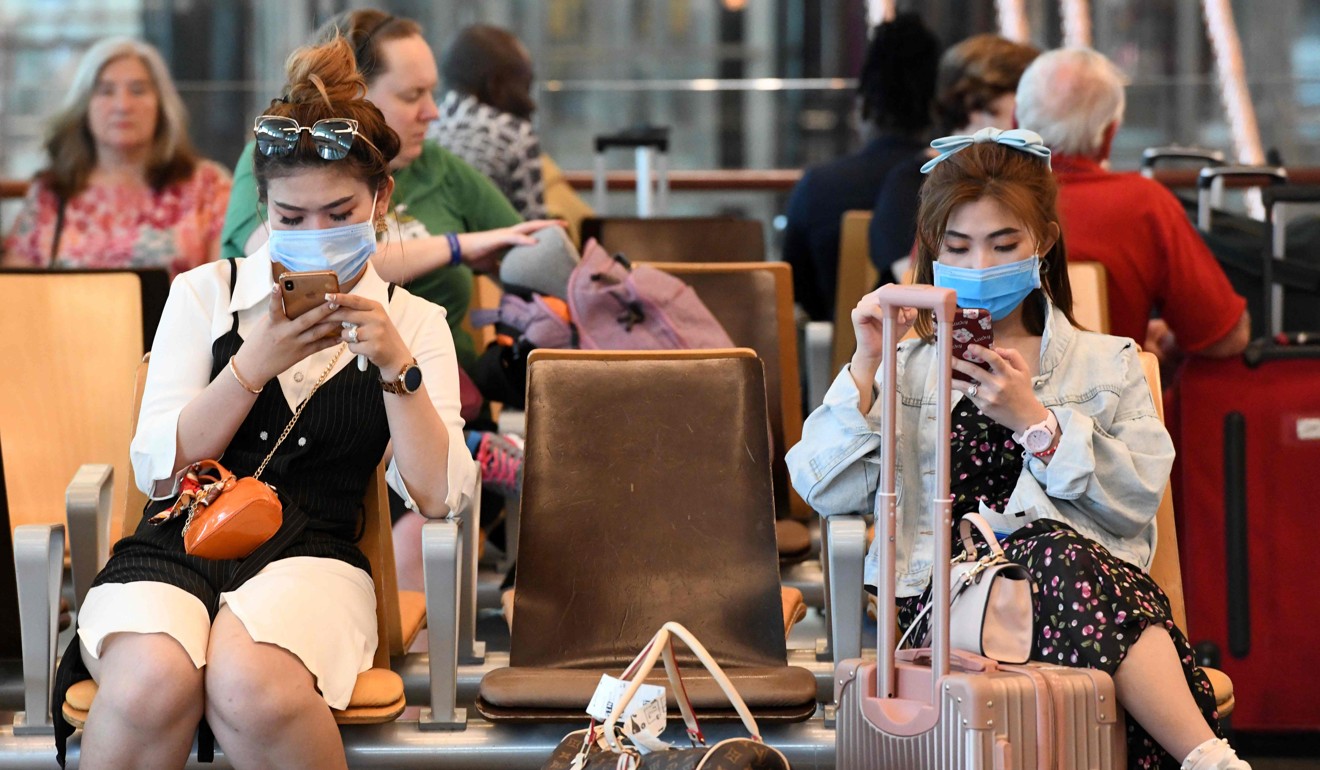
Coronavirus: Singaporeans tread with caution, but a ‘new normal’ appears
- Life in the city is slowly going back to normal, albeit with a little more hand hygiene
- Singapore’s prime minister has warned the virus outbreak could be around for up to a year

Seven weeks into Singapore’s coronavirus outbreak, life at nightclub Headquarters has pretty much returned to normal, with crowds dancing until the wee hours of the morning. The only difference between now and before Covid-19 hit the city state: the hand soap in the washroom runs out twice as fast.
Club owner Eileen Chan, 30, said the crowd had dipped for two weeks in early February but has started to pick up again. “One of the good things is that people are a little bit more socially responsible; it is great that people are washing their hands after using the toilet, although that should already be the norm,” she quipped.
Life in the city is slowly picking up as Singaporeans incorporate more hygienic habits into their daily routines to cope with the virus. Although the disease spread had stabilised, with an average of just five new cases reported daily from February 15, Singapore saw the largest single-day jump on March 6 with 13 new cases.
Authorities also identified new clusters linked to “socially irresponsible actions”.
Health Minister Gan Kim Yong on Tuesday chided people who were sick but continued to work in offices and go about their daily lives, unknowingly spreading the infection to others.
The country’s latest cluster sprang from a private dinner at the recreational club SAFRA Jurong, where one infected person spread the disease to 18 others, with the cluster eventually growing to 40 cases. A separate cluster traced to the Wizlearn Technologies offices in Science Park also started from staff who went to work sick.
“Such socially irresponsible behaviour poses a risk to all of us,” said Gan, adding that such activities rendered the country’s coronavirus-prevention measures futile.
But authorities have also emphasised that life cannot simply come to a standstill, given that the outbreak could be here for at least a year, as Prime Minister Lee Hsien Loong said earlier this week.
They have rolled out social distancing measures such as telling organisers to cancel or postpone ticketed events with more than 250 people and are prepared to close schools if the number of cases surge. Companies are being encouraged to allow employees to work from home or stagger work hours.
The strategy follows a similar tack implemented in Hong Kong, where the authorities have closed schools since the Lunar New Year break began in late January and advised citizens to keep a safe distance from one another in public spaces.
With Singapore releasing electoral boundaries on Friday signalling that elections are on the cards soon, it remains to be seen how campaigning in public housing estates and rallies will take place amid measures to prevent crowds from gathering.

THE NEW NORMAL
In striking a balance between caution – hewing to the advice of Gan and the Health Ministry – and continuing their daily routines, Singaporeans have been trying to shift activities outdoors while avoiding crowds, but still going to work and meeting friends and family as before, just with extra precautions such as regularly washing hands.
Event sales manager Carol Kow, 43, said she had gotten used to a “new normal” and feels more at ease now compared with during the early weeks of the outbreak, after Singapore reported its first case on January 23.
“I feel that Singapore has controlled the outbreak pretty well compared to the rest of the world,” she said. “The first two to three weeks was when we were the most concerned and everyone was looking for masks.”
Singaporeans did panic when the Disease Outbreak Response System Condition was raised to the “orange” level on February 7, sweeping daily necessities off supermarket shelves. And for a few weeks, the worry seemed justified because Singapore had some of the highest infection numbers outside China.
But as the weeks bore on, with South Korea and Italy seeing sudden spikes – Italy went from one case on February 20 to more than 15,000 in three weeks – and the disease spreading to more than 100 countries, Singapore’s situation started to look tame by comparison.
The Singaporeans This Week in Asia interviewed heaped praise on their government, saying the authorities had a handle on the situation. They said what gave them confidence was the Health Ministry’s daily updates, and that most of the cases in Singapore could be traced to clusters – meaning there was no widespread local transmission of the disease.
As of Thursday, Singapore had reported 187 cases of infection. Of those, 96 had been discharged while nine were still in intensive care units of local hospitals.
Rafi Dean, 40, director of audio-visual consulting firm ARK-AV, said that the number of reported infections may be rising but he believed it was because of efficient detection methods. “The discharges are also going up. So there is nothing to worry about if everyone does their part,” he said.
G Foong, 49, a public relations consultant, said she appreciated the government sharing that 35 of the people who had contracted the virus, out of the first 160 reported cases, had gone for various activities despite being sick. We have to tell people that even though it’s very mild, you still have to stay at home,” she said.

‘IF YOU’RE SICK, DON’T APPEAR’
Patsy Tan, a retired publishing industry executive in her 60s, said she was abiding by one rule of thumb in order to be socially responsible: “If you’re sick, just don’t appear.”
Her views were echoed by other Singaporeans.
Entrepreneur Derrick Foo said he went out to watch a play last weekend, but was seated next to a woman with a hacking cough who was blowing her nose throughout the performance. “She sounded really sick,” he said. “She should have stayed at home if she wasn’t feeling well.”
But Singapore is not alone in experiencing such self-serving social activities. In Australia, patients reportedly meant to be in self-isolation have visited nightclubs, shopped for groceries and attended cricket games. In the United States, an employee of the Dartmouth-Hitchcock Medical Centre was told to avoid contact with others pending further tests, but he went to a crowded music venue instead.
According to Paul Lim, who lectures on ethics at Singapore Management University, people have different views on social responsibility.
“If one believes in maximising one’s happiness over pain, sometimes at the expense of others, this would be a utilitarian view,” he explained. “A more duty-bound approach would be to do what is morally right, that is to play a part in being socially responsible so as to restrict the spread of the virus.
For the Singapore government, that means more social-distancing measures. In an address to the nation on Thursday, Prime Minister Lee Hsien Loong said such measures could include school closures and the shortening of religious services.
But Lee also reassured Singaporeans that the situation was under control and that the country would not be locked down. He described the new measures as extra “brakes” to slow the transmission of the virus so the healthcare system would not be overwhelmed, given that the virus could be around for “a year, and maybe longer”.
“After the situation improves, we can ease off and go back to the baseline precautions,” he said.

MAINTAINING A BASELINE
For Kow, the event sales manager, baseline precautionary measures include cutting down on gatherings with friends, meeting family at home instead of at restaurants, and disinfecting her children’s bags every day. Her sons, aged 9 and 11, are also more amenable to washing their hands these days thanks to recent school drills. “Before this, if you ask them to do so they will whine and say their hands are already very clean,” she said.
Tan, the retiree, is a little more cautious. She is hiking outdoors instead of going to the gym and postponing beauty appointments to avoid close contact with therapists and hairstylists. She also does her grocery shopping in the afternoon when the supermarkets are less crowded, and meets friends for alfresco dining instead of sitting indoors.
And while many interviewees have decided that Singapore is a safe place to be and are postponing holidays for now, T. Lim, 33, who works in the hospitality industry, said she was going ahead with her Eastern Europe travel plans next month. She said that although she feels safer in Singapore and her parents would rather her family of four stay put, she had already paid S$7,000 for flights and accommodation and so she would carry on as scheduled, but armed with hand sanitisers and prepared for regular hand washings.
“We don’t think it is such a big deal,” she said of the disease. “It’s already everywhere and is quite avoidable. To put it bluntly, it’s about whether or not you’re suay,” she said, referencing a colloquial term meaning unlucky.